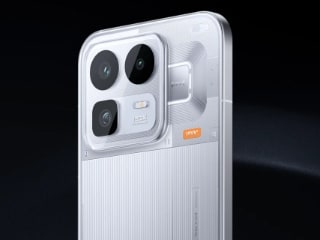- Home
- Mobiles
- Mobiles Reviews
- Realme 13+ Review: Good Performance on a Budget
Realme 13+ Review: Good Performance on a Budget
The Realme 13+ is excellent for playing games.

The marble like design on the back panel is interesting to look at
Realme recently unveiled batch two of its latest numbers series in India, including the Realme 13 and the Realme 13+. The new phones offer upgraded processors, design changes, and a couple of other improvements over their predecessors. Both are mid-range phones that are priced under Rs. 30,000. I've had the Realme 13+ with me for almost 10 days now, and I've been mostly wondering why Realme launched this phone when its predecessor, the Realme 12+, was only about five months old. It turns out there are a couple of reasons why. But does it make sense to upgrade from the Realme 12+? Read on to find out.
In India, the Realme 13+ starts at Rs. 22,999 for the 8GB + 128GB variant, whereas the 8GB + 256GB and 12GB + 256GB options are listed at Rs. 24,999 and Rs. 26,999, respectively. Our review unit came with 8GB RAM and 128GB storage.
Realme 13+ Design: New rear panel
- Dimensions - 161.7 x 74.7 x 7.6mm
- Weight - 185g
- Colours - Dark Purple, Speed Green, and Victory Gold
The Realme 13+ offers a similar design to the older 12+ model if you look at the phone from the front, but there are a couple of changes at the back. It now gets a new rear panel pattern and a slightly redesigned camera module. According to Realme, the inspiration for the pattern comes from the keywords ‘Victory' and ‘Speed'. There's a curve below the camera module that offers a design distinction. The top part of the phone has a plain matte finish, whereas the bottom has a marble-like design. We got the Dark Purple colour option, which looks more black than purple.
![]()
The marble-like pattern on the back panel is more prominent under certain lighting
The camera module is now more oval than a circle, and the ring surrounding it has some camera specifications etched onto it. The new design is nicer than its predecessor, but I miss the leather finish. Luckily, the entire rear panel offers a matte finish and doesn't attract any fingerprints. The rear panel also has slightly curved edges, which makes the phone comfortable to hold.
Realme uses die-cast aluminium and a one-piece metal skeleton on the phone for durability. The phone has flat sides and feels quite sturdy and well-balanced. You'll find the power and volume buttons on the right, whereas the top houses a 3.5mm headphone jack, a speaker grille, and a microphone. The bottom gets another microphone, speaker grille, USB Type-C port and SIM tray slot.
![]()
You get a 3.5mm headphone jack at the top
The phone is now IP65 rated, higher than the IP54 rating on the Realme 12+. The SIM card tray now features a red rubber gasket.
Realme 13+ Display: Vivid and smooth
- Screen size - 6.67-inch full-HD+ AMOLED
- Refresh rate - 60/120Hz
- Protection - Panda Glass
The Realme 13+ gets a flat display with slim borders at the top and sides with a slightly thicker chin. It's protected by Panda glass and comes with a thin film pre-installed. It's best to take that off and get a proper screen protector. The display uses a Samsung-made E4 AMOLED panel that offers up to 120Hz refresh rate and full-HD+ resolution. The panel has a peak brightness rating of 2,000 nits and is readable outdoors. Realme states that the panel meets 100 percent P3 colour gamut, and in usage, I found that the display offers vibrant colours and deep blacks.
![]()
The display supports up to 120Hz refresh rate and offers several colour modes
You get four colour modes in the Settings app – Vivid, Natural, Cinematic, and Brilliant. I'd say stick with Vivid or Brilliant if you like pop colours. There's also a Bright HDR video mode available as the screen does support HDR10+ and offers HDR image support as well. For those who like to use their phone with wet fingers, the display also has the Rainwater Smart Touch feature.
![]()
The phone also offers a face unlock feature
The display features a hole-punch cutout at the top and there's an in-display fingerprint scanner at the bottom. I'm not a big fan of its placement, but it works well.
Realme 13+ Software: Please stop the bloatware
- UI - Realme UI 5.0
- OS - Android 14
- Latest security patch - July
I've used enough budget and mid-range Realme phones to know that there will be plenty of bloatware. It's the same story with the Realme 13+. The phone runs Android 14-based Realme UI 5.0 out of the box and comes pre-installed with several games, a Glance lock screen, Hot apps, Hot games, and so on. Fortunately, most can be uninstalled, and things like Hot Apps can be disabled. Still, it would've been nicer not to have them on the phone.
Realme has promised two years of OS updates with three years of security patches, which is similar to what some of the competition offers. With Realme UI 5.0, you also get some AI-powered features such as AI Clear Voice, which is claimed to improve call quality and Smart Loop, which lets you share selected content quickly with other apps. There are also Air gestures, a Smart sidebar, a Split view, and several other features that you'll find in Settings > Accessibility and Convenience.
Realme 13+ Performance: Games run smooth
- Chipset - MediaTek Dimensity 7300 Energy
- RAM - Up to 12GB
- Storage - Up to 256GB
Coming to performance, the MediaTek Dimensity 7300 Energy SoC on the phone is good for daily use and gaming. It's one of the phone's key selling points, and I understand why. Although I did face some hiccups while navigating through the UI and launching apps, the phone never lagged when playing games. This chipset is excellent for gaming on a budget. It also has up to 12GB RAM and 256GB storage.
![]()
The phone doesn't heat up much when playing games
As always, I ran our usual set of benchmarks on the phone to see how it compares to other phones in the same price segment.
| Benchmark | Realme 13+ | Motorola Edge 50 Fusion | Nothing Phone 2a |
|---|---|---|---|
| AnTuTu v10 | 6,85,135 | 6,12,950 | 6,88,079 |
| PCMark Work 3.0 | 12,377 | 14,055 | 12,486 |
| Geekbench Single | 1,044 | 1,018 | 1,100 |
| Geekbench Multi | 2,945 | 2,949 | 2,448 |
| GFXB T-rex | 61 | 104 | 60 |
| GFXB Manhattan 3.1 | 50 | 49 | 57 |
| GFXB Car Chase | 29 | 25 | 34 |
| 3DM Slingshot Extreme OpenGL | 5,174 | 4,758 | 5,902 |
| 3DM Slingshot | 6,672 | 6,414 | 6,872 |
| 3DM Wild Life | 3,161 | 3,035 | 4,165 |
| 3DM Wild Life Unlimited | 3,155 | 3,065 | 4,272 |
The phone performed quite well in the benchmarks but did even better in real life. One of the reasons why this phone excels in gaming is due to the 6050mm² stainless steel vapour cooling chamber that Realme included here. Even during long BGMI sessions, the phone got slightly warm. I ran BGMI at the max available graphics, and it ran smoothly and delivered between 80 - 90fps. There's also a GT mode that ensures maximum frames in all games, and it worked as advertised even on COD.
Apart from gaming, the phone did quite well during phone calls and 5G download speed tests. I also found the dual speaker setup on the phone loud and clear, but I wish it had a little more bass.
Realme 13+ Cameras: Quite good
- Main Rear - 50-megapixel Sony LYT-600, f/1.8, OIS
- Secondary camera - 2-megapixel
- Selfie camera - 16-megapixel
Realme claimed that its non-Pro number series will focus on performance more than cameras, but I found the camera setup on the Realme 13+ to be pretty good during the day. There's a dual camera setup at the back, which sadly doesn't have an ultrawide. The camera app is easy to use and gives you direct controls to all the different modes. There's also a Pro mode.
![]()
It would've been nicer to have an ultrawide camera instead of the depth sensor
The primary 50-megapixel Sony LYT-600 sensor shoots good photos in daylight conditions. They have great detail, slightly boosted colours, and a decent dynamic range. The white balance is also pretty good in daylight conditions, and the images have no strange hues. The Sony sensor also works well in low-light conditions, providing enough light. The camera switches to auto night mode, taking a few seconds, but the results are usable. Of course, there's some noise, but it's not too bad, honestly. Check out some samples below.![]()
![]()
![]()
![]()
![]()
![]()
Top to Bottom: 3 x Daylight photos, 3 x Lowlight photos, 1 x Portrait photo [Tap to Expand]
Unfortunately, there's no other usable sensor on the phone. The secondary camera is a depth sensor that helps with portrait photos, but the results aren't that great. Moving on to the front, the selfie camera also lacks skin colour and details, but it takes good photos in daylight conditions. However, it suffers even more in low-light conditions. Coming to video, the Realme 13+ can shoot videos at a max resolution of 4K at 30fps. You'll need to switch to 1080p at 60fps for ultra-steady video. The video quality is decent, and you can get well-stabilised shots in daylight with punchy colours.
Realme 13+ Battery: Long lasting
- Capacity - 5,000mAh
- Fast charging - 80W
- Charger - Included
The Realme 13+ has a 5,000mAh battery that can easily last a day or longer with normal usage. While 5,000mAh isn't anything special at this price range, 80W fast charging support is included.
![]()
An 80W charger is included in the box
In our HD video loop test, the smartphone lasted about 29 hours, which is pretty impressive. In day-to-day usage, I got about 6-7 hours of screen on time with the screen set at 120Hz refresh rate. As for charging speeds, the phone went from dead to 100 percent in about 55 minutes. You can get a full day's charge with about 30 minutes of charge.
Realme 13+ Verdict
If you're out to purchase a budget phone that's great for gaming and offers good battery life, the Realme 13+ is an excellent choice. The phone also has a decent primary rear camera, a smooth display, and a nice minimal design, and you get a segment-best 80W fast charging. However, if you're upgrading from a Realme 12+, I think you should skip this one.
There are quite a few alternatives in the same price range. For example, the Nothing Phone 2a (Review) is also a good choice if you want a unique design, similar performance, decent cameras, and a much better software experience. The Motorola Edge 50 Fusion (Review) also offers better cameras, software, and design. You could also look at something like the OnePlus Nord CE 4 (Review), which offers improvements in all areas.
Catch the latest from the Consumer Electronics Show on Gadgets 360, at our CES 2026 hub.
Related Stories
- Samsung Galaxy Unpacked 2025
- ChatGPT
- Redmi Note 14 Pro+
- iPhone 16
- Apple Vision Pro
- Oneplus 12
- OnePlus Nord CE 3 Lite 5G
- iPhone 13
- Xiaomi 14 Pro
- Oppo Find N3
- Tecno Spark Go (2023)
- Realme V30
- Best Phones Under 25000
- Samsung Galaxy S24 Series
- Cryptocurrency
- iQoo 12
- Samsung Galaxy S24 Ultra
- Giottus
- Samsung Galaxy Z Flip 5
- Apple 'Scary Fast'
- Housefull 5
- GoPro Hero 12 Black Review
- Invincible Season 2
- JioGlass
- HD Ready TV
- Laptop Under 50000
- Smartwatch Under 10000
- Latest Mobile Phones
- Compare Phones
- Realme Neo 8
- OPPO Reno 15 FS
- Red Magic 11 Air
- Honor Magic 8 RSR Porsche Design
- Honor Magic 8 Pro Air
- Infinix Note Edge
- Lava Blaze Duo 3
- Tecno Spark Go 3
- Acer Chromebook 311 (2026)
- Acer Chromebook Spin 311
- Lenovo Idea Tab Plus
- Realme Pad 3
- Moto Watch
- Garmin Quatix 8 Pro
- Haier H5E Series
- Acerpure Nitro Z Series 100-inch QLED TV
- Asus ROG Ally
- Nintendo Switch Lite
- Haier 1.6 Ton 5 Star Inverter Split AC (HSU19G-MZAID5BN-INV)
- Haier 1.6 Ton 5 Star Inverter Split AC (HSU19G-MZAIM5BN-INV)


















